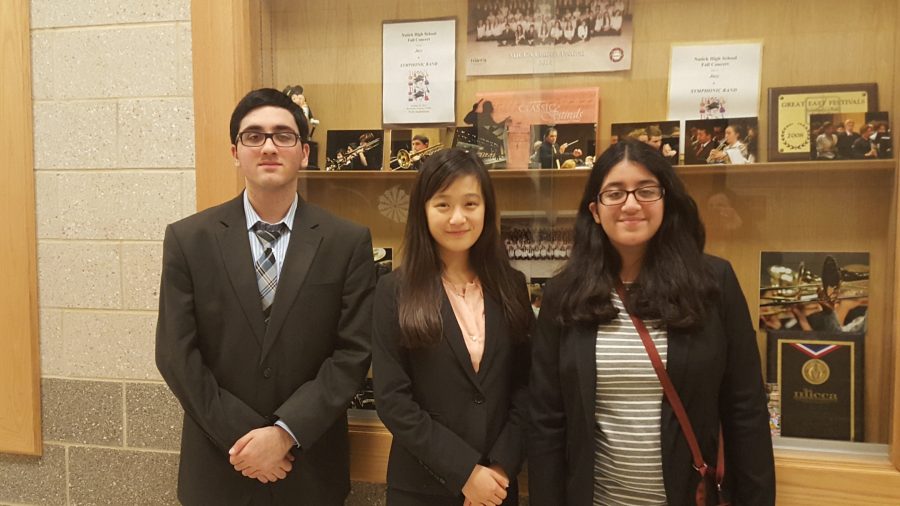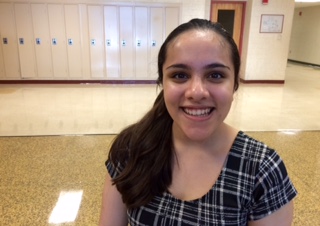Speech and Debate team provides different type of sport
Speech and Debate team president and junior Erika Lu poses alongside members and sophomores Sarah and Numaan Dogar.
April 14, 2016
The Speech and Debate team gives students the opportunity to test and build their confidence, speaking abilities, and reasoning skills.
Junior Erika Lu started the team after realizing its popularity in other schools.
“In other schools, debate’s basically treated as a sport,” Lu said. “There are national and international tournaments. I thought I’d bring some of that here so we can debate at Algonquin.”
New members are gradually introduced to debate by competing in a novice tournament.
“For the novice tournament, we teach how public forum works, which is a really good debate to start with,” Lu said. “Not only do you have a partner go with you into your first debate, which is really nerve wracking, you can also talk about a current event topic. It’s not really some topic that you’ve never heard of.”
Members admit that their first competition was an intimidating experience.
“I actually froze and couldn’t say anything,” junior Rebecca Wixted said. “But then in the next round, I figured out what I needed to do and reassured myself by saying it couldn’t be as worse as last time, so by the end of the tournament I felt a lot more confident.”
Though lacking assets such as a hired coach, which is available to other schools, Algonquin members won 14 out of 16 rounds at their first novice tournament.
“It felt like validation of all the hard work and research we put into it,” sophomore Numaan Dogar said.
Members believe Algonquin’s debate team provides a competitive yet collaborative atmosphere.
“Other debate teams are super preppy and your captains are people who have done debate for a long time, so you just do what they say and don’t argue with them,” Dogar said. “Here, it’s more of a group building each other up, and you can choose whether or not to accept critiques.”
Members have grown more confident in their speaking abilities due to the team.
“What surprises me the most is that these kids are probably kids that are timid, but are volunteering to overcome it,” club advisor John Barry said. “So I’m noticing the confidence level growing. Knowing that you have to speak in front of an audience and you volunteered to do that means you put yourself through the rigors of overcoming anxieties, overcoming a nervousness that goes along with it.”
Debate gives members effective communication and analyzation skills to use in everyday life.
“It incentivizes you to be a much better researcher; it incentivizes you to organize your research better, and it incentivizes you to process your research and make arguments better and quicker, and I think that trickles down to your ability to write well,” Barry said. “It trickles down to your ability to critically think through problems and see things through many different lenses instead of just a few, which makes you a broader based thinker.”
Unlike debate, speech is an entirely different form of competition.
“Speech has it’s own branches with its own specific rules,” Lu said. “In debate, you are thinking more about the logic behind the debate. While in speech, your delivery matters a lot more. Of course, for both you have to be a good speaker in order to be convincing.”
Members feel Lu is experienced and possesses good leadership qualities.
“When I first came here, I didn’t know anything about debate, and [Lu] was able to help teach it to us all. I like the way she teaches us, it’s more like a friend helping a friend, rather a than a coach teaching it to us,” Dogar said.
Members hope that the club gains popularity in years to come.
“I think a lot of kids don’t know this club exists,” Barry said. “This isn’t just a bunch of kids who ‘debate’ every Tuesday. There’s a lot of kids in this school that probably aren’t athletes, and they might not be particular dancers and singers, but they’re looking for an outlet to demonstrate a passion that they have. This club should be three times the size it is,” Barry said.
Stop by the Speech and Debate team meetings on Tuesdays in G109.










